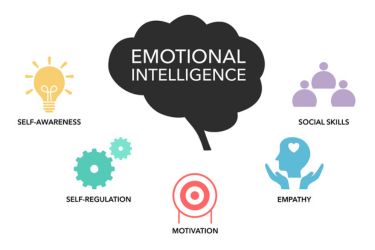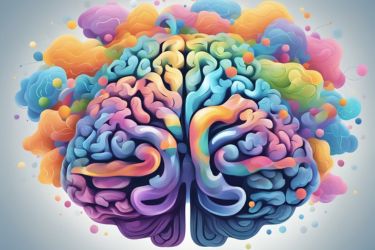Emotional intelligence (EI) plays a crucial role in shaping how individuals interact and connect with others. Understanding and developing emotional intelligence can lead to better communication, deeper relationships, and improved conflict resolution skills. It is through emotional intelligence that people can understand their own feelings and the feelings of others, fostering healthier and more meaningful connections.

People with high emotional intelligence are often more adept at navigating social situations and maintaining strong relationships. They tend to make thoughtful decisions based on their emotional awareness, which enhances their ability to manage stress and resolve conflicts. By recognising the importance of emotional intelligence, individuals can work towards building more fulfilling personal and professional relationships.
As one delves into the concept of emotional intelligence, it becomes clear that enhancing this skill set can lead to significant improvements in various aspects of life. With a focus on self-awareness, empathy, and effective communication, emotional intelligence serves as a foundation for understanding and fostering better relationships.
Key Concepts of Emotional Intelligence

Emotional intelligence encompasses several core concepts that contribute to better relationships and personal well-being. These include understanding emotional awareness, managing emotional responses, and fostering motivation for personal growth.
Defining Emotional Intelligence and Its Components
Emotional intelligence (EQ) refers to the ability to recognise, understand, and manage one’s emotions while also understanding the emotions of others. It consists of five main components: self-awareness, self-regulation, motivation, empathy, and social skills. Each element plays a crucial role in how individuals interact and respond to different situations.
Developing emotional intelligence helps strengthen interpersonal relationships by enhancing communication and understanding. Those with high EQ are often able to navigate social complexities better and build stronger connections with others.
Self-Awareness and Emotional Awareness
Self-awareness is the foundation of emotional intelligence. It involves recognising one's own emotions and understanding how they affect thoughts and behaviours. This level of awareness allows individuals to identify their emotional triggers and patterns.
Emotional awareness extends beyond oneself; it also includes understanding the emotions of those around them. By developing these skills, individuals can better respond to others, showing empathy and fostering supportive interactions. Cultivating self-awareness leads to more informed decisions and improved relationships.
Self-Regulation and Management of Emotional Responses
Self-regulation refers to the ability to control one’s emotions and adapt to changing situations. Individuals with strong self-regulation can manage impulsive feelings and behaviours effectively. This skill is key to maintaining composure during stressful situations.
Managing emotional responses involves recognising when emotions may lead one astray and employing strategies to maintain balance. Techniques such as mindfulness, deep breathing, and cognitive reframing can help individuals respond rather than react emotionally. Mastering self-regulation contributes to better conflict resolution and healthier relationships.
Motivation and Personal Growth
Motivation is a critical aspect of emotional intelligence that drives personal growth. It involves having the inner drive to pursue goals, remain resilient in the face of challenges, and foster a positive outlook. Individuals with high emotional intelligence tend to be more motivated, as they harness their emotions to fuel their ambitions.
Personal growth related to emotional intelligence includes ongoing learning, self-improvement, and a commitment to developing emotional skills. This growth mindset encourages individuals to seek feedback, adapt, and evolve in their personal and professional lives. Cultivating motivation is essential for achieving long-term satisfaction and success.
The Role of Empathy and Social Awareness

Empathy and social awareness are essential for building healthy relationships. They enable individuals to connect deeply with others and understand their feelings and perspectives. This section explores empathy, how to develop it along with social intelligence, and the importance of social awareness in relationships.
Understanding Empathy
Empathy is the ability to understand and share the feelings of another person. It involves recognising emotions and being able to respond appropriately. There are two main types of empathy: cognitive and emotional.
- Cognitive empathy allows a person to understand another's perspective.
- Emotional empathy involves sharing the feelings of others.
Developing empathy helps individuals communicate better and fosters trust. It encourages individuals to be open and responsive, which strengthens connections.
Developing Empathy and Social Intelligence
Developing empathy and social intelligence can be achieved through practice. Here are some effective strategies:
-
Listen actively: Engaging in active listening helps understand others better. Focus on what the person is saying without distractions.
-
Ask questions: Being curious about others' experiences encourages deeper understanding. Questions can reveal feelings and motivations.
-
Reflect on emotions: Recognising one's own feelings can enhance empathy. When individuals understand their emotions, they are more equipped to understand others.
-
Observe social cues: Being aware of non-verbal signals, like body language, can provide insight into others' feelings.
These actions promote a more empathetic approach to interactions, enhancing social intelligence.
The Importance of Social Awareness in Relationships
Social awareness is the ability to comprehend the emotions and needs of others. It plays a significant role in building strong relationships.
Individuals with high social awareness can:
-
Recognise emotional cues: They can interpret how others feel, even if not openly expressed.
-
Adapt their responses: By understanding others' emotions, they can adjust their behaviour accordingly.
-
Foster collaboration: Socially aware individuals can work more effectively within groups, leading to better teamwork.
In relationships, social awareness helps to build emotional connections. It allows for empathy to flourish, leading to stronger and more meaningful interactions.
Effective Communication and Interpersonal Skills

Effective communication and strong interpersonal skills are essential for building meaningful relationships. They enable individuals to connect on a deeper level and foster trust. This section covers key aspects such as active listening, non-verbal cues, and the importance of trust in communication.
Active Listening and Verbal Communication
Active listening is a vital skill that goes beyond simply hearing words. It involves fully engaging with the speaker, providing feedback, and showing empathy. When someone practices active listening, they validate the other person's feelings, which can build trust and create a safe space for sharing.
Verbal communication includes the choice of words and tone of voice. Using clear, concise language helps avoid misunderstandings. Asking open-ended questions encourages dialogue, while summarising what has been said ensures clarity. This approach not only enhances interpersonal skills but also allows individuals to express their thoughts effectively, leading to stronger relationships.
Non-Verbal Cues and Social Navigation
Non-verbal cues, such as body language, facial expressions, and eye contact, play a significant role in communication. They can often convey more than words. For instance, crossed arms may signal defensiveness, while a smile can indicate openness.
Social navigation involves understanding these cues and responding appropriately. Recognising the emotional state of others through their non-verbal signals can help in adjusting one's own behaviour to maintain harmony. This awareness also aids in developing interpersonal skills, as it allows one to connect and interact more effectively in social situations.
Trust and Meaningful Connections
Trust is a cornerstone of effective communication. It forms the basis of all meaningful connections between individuals. When trust is established, people feel more comfortable sharing their thoughts and emotions without fear of judgment.
Building trust requires consistency, honesty, and reliability. When individuals demonstrate these qualities in their interactions, they enhance their communication skills, fostering deeper, more authentic relationships. As trust grows, so do the emotional connections, making communication more impactful and fulfilling.
Managing Relationships and Team Dynamics

Effective management of relationships and team dynamics is essential in any workplace. Emotional intelligence plays a key role in navigating these interactions, ensuring collaboration, and resolving conflicts.
Conflict Resolution and Constructive Criticism
Conflict is an inevitable part of any team. Recognising emotional triggers can help in addressing disputes before they escalate. Individuals with strong emotional intelligence are better equipped to handle disagreements calmly.
Constructive criticism is vital for growth. It should be delivered in a respectful and clear manner. Focus on specific behaviours rather than personal faults. This approach fosters a positive atmosphere where team members feel valued and motivated to improve.
Techniques such as active listening and empathy can bridge gaps between differing opinions. When team members feel heard, they are more likely to engage in productive discussions.
Collaboration and Relationship Management
Collaboration thrives when individuals understand each other’s emotions and motivations. Team players who demonstrate high emotional intelligence can connect with their peers on a deeper level.
Effective relationship management involves building trust and rapport. Strategies like open communication and regular feedback encourage a cooperative environment. Team members should share their goals and challenges openly to foster a collective sense of purpose.
Utilising tools for collaboration, such as shared platforms and regular check-ins, can enhance engagement and productivity. This ensures that all team members feel included and accountable for their contributions.
Leadership and Influence in the Workplace
Business leaders with high emotional intelligence can inspire their teams. They use their skills to motivate others and create a positive workplace culture. A leader’s ability to connect emotionally with their team enhances trust and commitment to shared goals.
Influence in the workplace is also about listening and validating team members’ feelings. Leaders who practice empathy encourage a two-way dialogue. This helps to address concerns and leverage diverse perspectives.
Connecting emotionally can lead to better decision-making. Leaders who understand their team’s dynamics can guide them more effectively. This ultimately results in improved performance and cohesion throughout the organisation.
Applying EI to Achieve Well-Being and Success
Emotional intelligence plays a crucial role in enhancing well-being and achieving success. By developing key aspects like stress management, recognising emotional triggers, and utilising EI in career settings, individuals can create a more fulfilling life both personally and professionally.
Stress Management and Mental Health
Emotional intelligence helps in managing stress effectively. Individuals with high EI can recognise their emotional responses to stressors. This awareness enables them to implement coping strategies tailored to their needs, such as deep breathing, exercise, or seeking support from friends.
Effective stress management can lead to improved mental health. Recognising when stress levels rise allows one to take action before it affects their emotional state. By practising techniques such as mindfulness or meditation, individuals can enhance their resilience and overall well-being.
Emotional Triggers and Mindfulness Practice
Understanding emotional triggers is essential for maintaining emotional balance. These triggers can provoke intense feelings, influencing behaviour and responses in various situations. Individuals who develop EI can identify these triggers and respond thoughtfully rather than react impulsively.
Mindfulness practices play a vital role in this process. Activities such as meditation help individuals to stay grounded and present. Regular practice enables them to observe their thoughts and feelings without judgement, leading to greater calmness and control over their emotions. This approach fosters healthier responses to stress and enhances emotional regulation.
Career Success through Emotional Intelligence
In the workplace, emotional intelligence is a key factor in achieving career success. Those who possess strong EI can communicate better, collaborate effectively, and manage conflicts with ease. They often inspire others and build strong connections within teams.
Employers value employees with high emotional intelligence because they adapt well to challenges. They can lead teams confidently and offer constructive feedback, which fosters a positive work environment. By refining their emotional intelligence, individuals can improve their career prospects, leading to greater job satisfaction and personal growth.





















